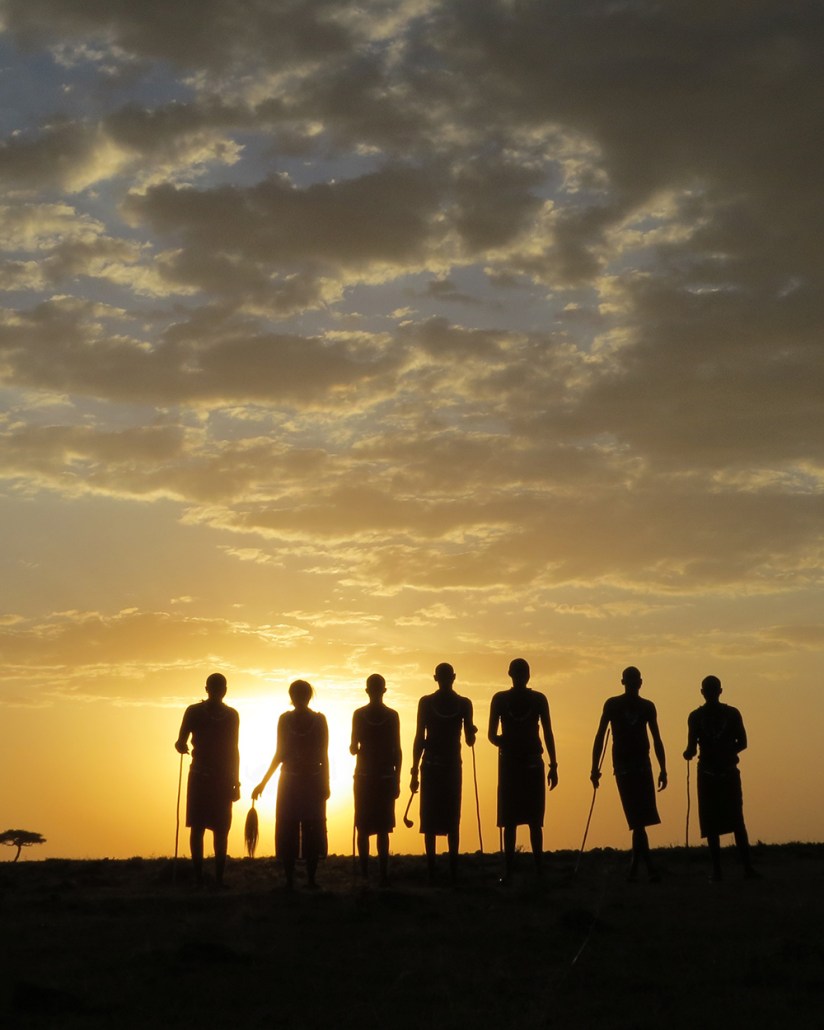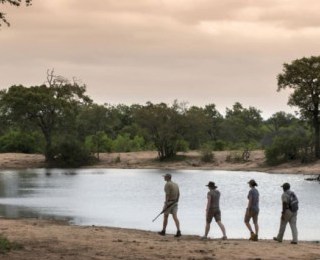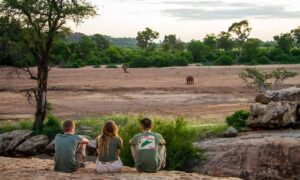 Here’s part two of our recent interview with Anton Lategan, one of the owners and managing director of EcoTraining Guides & Guardians, which offers a range of field courses in South Africa, Botswana and Kenya to would-be guides, environmental students or anyone else who wants to learn more about the African bush or mankind’s interrelationship with nature.
Here’s part two of our recent interview with Anton Lategan, one of the owners and managing director of EcoTraining Guides & Guardians, which offers a range of field courses in South Africa, Botswana and Kenya to would-be guides, environmental students or anyone else who wants to learn more about the African bush or mankind’s interrelationship with nature.
EcoTraining has a philosophy was getting students “as close to the earth as possible” while they’re taking your courses. What exactly does that mean?
We use the phrase “reconnect man to nature.” It’s safe to say that we were much more connected to the land a few hundred years ago. We all got by with less and we were more adapted to the environment on all continents and all hemispheres. In the last few hundred years, we’ve become quite dependent on storing food and mechanization and all this stuff. I’m of the opinion that a lot of the modern problems that we face are directly connected to our disconnect from the natural world. This can be seen at individual, community and global levels. Urbanization, overpopulation and economic pressure manifests in our physical, mental and spiritual well being.
What’s this got to do with the African bush?
In a natural ecosystem, by definition “ecology” means the combination of all living and all non-living things and the interactions between them. Now what we’ve done as modern man is, we have put a glass or aluminum or brick and mortar frame around us and called it a house, apartment or building. We separate ourselves from fresh air, sunlight and each other. We take little bits of what modern man has produced and then we modify the interactions with the ecosystem we were part of and we are surprised when we’re not in harmony. The system works well when we realize we are part of it. We are born from that system — it’s simple logic that if we want to get harmony we need to get back into the ecosystem.
So how do you do that?
Realistically we can’t go and live like a caveman and wear animal skins because probably most people won’t cope or like it. But you still should have a reasonable understanding of the environment in the modern 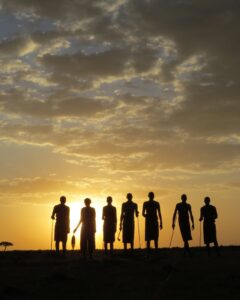 world. EcoTraining takes people into beautiful, natural environments where they are in awe of nature. Quite often the message is led by the charismatic animals like elephants or lions, termites or birds, eagles or butterflies. Their natural behavior and interactions read like a brilliant book to learn from.
world. EcoTraining takes people into beautiful, natural environments where they are in awe of nature. Quite often the message is led by the charismatic animals like elephants or lions, termites or birds, eagles or butterflies. Their natural behavior and interactions read like a brilliant book to learn from.
At EcoTraining we aim to get into the hearts and minds of the modern person and show them places and share experiences where their modern psyche can be won over by their beautiful surroundings. Safari areas in Africa or mountainous areas in the northern hemisphere with impressive scenery, awe-inspiring landscapes and charismatic mega fauna are good for people to experience. You can see the ecosystem working and are reminded that we are part of it. It helps when we realize we are small.
I respect the luxury travel market very much as an important part of the sustainability of the ecosystems. But too many luxury lodges and camps keep you behind double-glazed windows, with air conditioning running and artificial lighting. So you’ve spent all those dollars to go on safari and you might as well be watching it on TV. Because other than the game drive or walk, you are actually back behind the layers of modernization in your luxury suite. The sensory immersion, star-filled skies and the distant hyena calls are better for your soul. Well done to the safari lodges that get this right!
At EcoTraining we are deliberate in trying to achieve this re-connection with nature. But we are responsible in our approach. We’ve trained over 11,000 people over the last 24 years and we have a good safety record. We respect nature. If you act in a harmonious way through a reasonable level of understanding and sensitivity, the natural world is wonderful and it’s our home.
Whether you come from Norway or South Africa, whatever tribe or culture, we are all natural beings and part of a natural system not so long ago. I see man as a being that lived in nature, with nature, out of nature. We connect those faculties which are our senses, our sensitivities, our sensibilities and reconnect them to the system that we are part of. If we can do that in accessible environments around the world, we can reactivate an ancient understanding. Modern people need to be reminded that they are only succeeding when their actions are in harmony with their environment instead of at its expense.
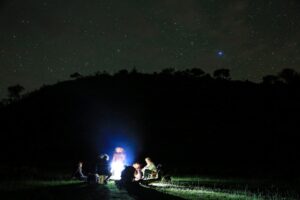 This is exactly what the world requires us to do. That’s why we have to keep it simple.
This is exactly what the world requires us to do. That’s why we have to keep it simple.
How do your students generally react to such close proximity to nature?
It’s very empowering for people once they get to what I call “a point of no return” — it’s a fundamental moment. Not everyone gets it and not everyone gets it all the time. It might be that beautiful sunset with lions roaring in the background. It might be the starry, starry night with hyenas in the distance. There is a point of no return that safari guides or eco trainers like ourselves can lead people to. But our technique must be respectful and subtle. Respectful to the environment because the main show is the environment — not the guide, not the trainer, not the ego, not the camera. The main focus should be on connecting people to something much greater than ourselves.
This often means getting people into a safe space — and then getting out of the way — because the connection is between them and nature.
What are your goals, your vision for the company?
I’ve been involved with EcoTraining for 20 years. I’m now 43. I started when I was 22 and I’m still quite idealistic. Although we’re a modest but successful company, what drives me is the need to reach more people sooner rather than later. Because I don’t think we’ve got that much time to turn the global situation around.
The USA has to be a big part of our mission because you are global leaders in many things. If we can reach the hearts and minds of America, we can impact the globe together. We have a similar strategic mission for China. We can reach people by expanding our range of products to appeal to a wider audience without losing our way. Without becoming a diluted commercial entity — which I never want EcoTraining to become.
I see media playing a very important role. I see online learning being important so as to reach more people. Online learning is a bit of a scorpion’s tail, because if you deliver excellent learning online, you might be misleading people to think that this medium of a screen is good enough. And it’s not good enough. The well being of individuals, the well being of society and the future of the world depends on humanity connecting with nature — not being a representation of nature through a screen. I see it as a tool, but it must never replace the natural experience. We need to be smart about not misrepresenting something that is much greater than us through manipulating media or by manipulating people through media.
Do you see EcoTraining expanding beyond its current Africa base into other parts of the world?
We will be driven by the ecosystem and respond to the natural demand in time. So far, we’ve delivered training in 10 countries as far away as Australia.
We have trained students from 33 countries that are now scattered all over the world. We helped set up nature guiding standards with Jordanians from the Middle East. We worked with the London Zoological Society training guides in Gabon in West Africa. So besides the camps we have, we also send our trainers out into different environments to lead the same sort of programs there.
And the natural question should arise: So how do you know what to train in somebody else’s backyard? My answer is that ecology is universal. If you understand the language of ecology — which comes down to the inter-relatedness of geology, soils, leaf structures, seed structures, root structures — without having to know all the local species, you can interpret the natural system anywhere.
I’ll give you some examples from nature. When a bird migrates from the steppes of Russia to southern Africa, it doesn’t know the terrain the first time it does this. Yet it knows how to survive in all of these different ecosystems it must fly through. When a lion goes into new territory, it doesn’t think to itself: I don’t know what the prey looks like around here. We need to behave in a natural way.
We bridge our training methodology with local expertise to ensure we are effective in different regions. I would love to have an impact in North and South America — the Rockies, Amazon and Pantanal stand out. In any mission we should engage with local partners to ensure we operate with respect and competence and we should focus on key conservation areas because this is where we will have immediate impact. True to ecology, we simply need to pioneer this relationship in the right soil and give way to natural ecological succession.
